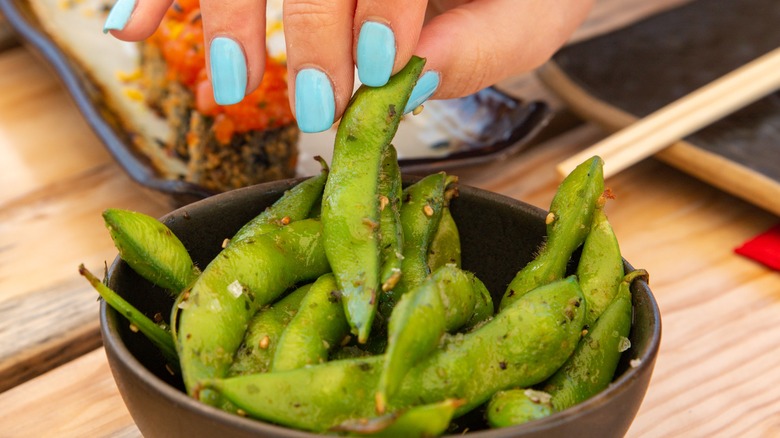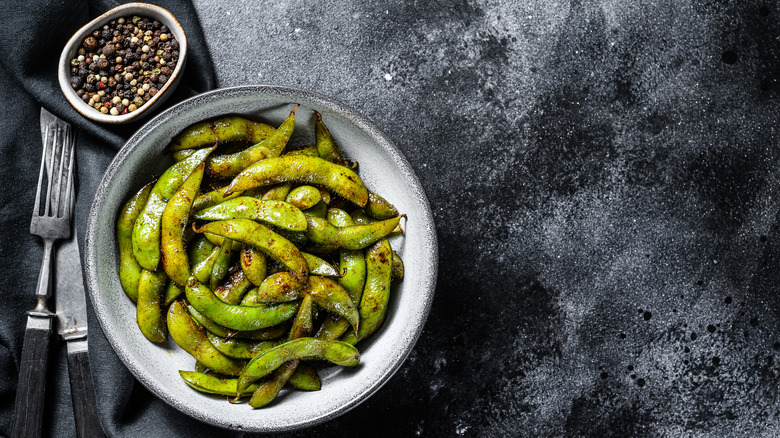Eating Edamame Has A Little-Known Effect On Your Blood Pressure
A growing number of Americans are eating edamame as a high-quality plant protein source. A 2021 research article published in Frontiers in Sustainable Food Systems cites that between 25,000 to 30,000 tons of soybeans, whether sold in pod form or as shelled beans, are eaten every year in the U.S.
The U.S. Department of Agriculture (USDA) reports that in 1 cup of cooked edamame, you'll find 18.5 grams of protein, 8 grams of fiber, 97.6 milligrams of calcium, over 99 milligrams of magnesium, 262 milligrams of phosphorus, and 675 milligrams of potassium. Yet it's one of these nutrients, in particular, that may have a positive effect on our blood pressure. Over 48% of American adults are living with hypertension, meaning their blood pressure reading exceeds 130/80 mmHg. This increases their susceptibility to heart disease and stroke, according to the U.S. Centers for Disease Control and Prevention (CDC). Here's how eating edamame may help lower those numbers.
How edamame may help lower blood pressure
Experts say that it's edamame's high levels of potassium that may positively influence our blood pressure. "One cup of prepared edamame provides 14% of the Daily Value for potassium, a mineral that counteracts sodium to support healthy blood pressure levels," registered dietitian Stephanie Wells told Forbes. The relationship between sodium and blood pressure lies in the fact that excess sodium consumption boosts fluid retention in the body. This increases our blood's fluid volume, which can heighten our blood pressure (per Johns Hopkins Medicine). Ideally, we want to keep our sodium intake below 2,300 milligrams daily. Snacking on edamame may help combat the effects of sodium on the body.
Potassium may not be the only compound in edamame that supports healthy blood pressure, however. Edamame also contains soy isoflavones, which have antioxidant properties and are said to support healthy cholesterol levels. In a 2024 meta-analysis published in the Nutrition Journal, researchers found that soy isoflavone supplements produced significant drops in patient systolic and diastolic blood pressure levels.
In a 2020 study published in the International Journal of Multidisciplinary Education and Research, it was found that 25 grams of edamame extract supplementation given over the course of 30 days improved the blood pressure levels of women in Indonesia who were of childbearing age with high blood pressure. Those in the intervention group also received a 5-milligram daily dose of a calcium channel blocker medication used to treat hypertension.
Tips for cooking edamame and potential health risks
The options are endless when it comes to how one can best enjoy edamame. After steaming, boiling, or microwaving the vegetable, you're free to include it in your favorite stir fry recipe, salad, or soup; or enjoy it as a stand-alone snack.
However, it's important that edamame be thoroughly cooked, otherwise it may prompt gastrointestinal distress if eaten in large amounts or by people with irritable bowel syndrome (IBS), notes MedicineNet. Individuals with soy allergies should avoid edamame altogether. Finally, edamame has been linked with potential malabsorption issues, so consider consulting with your doctor if you have any underlying medical conditions.
In addition to potentially lowering blood pressure levels, here are some other surprising health benefits of eating edamame.



